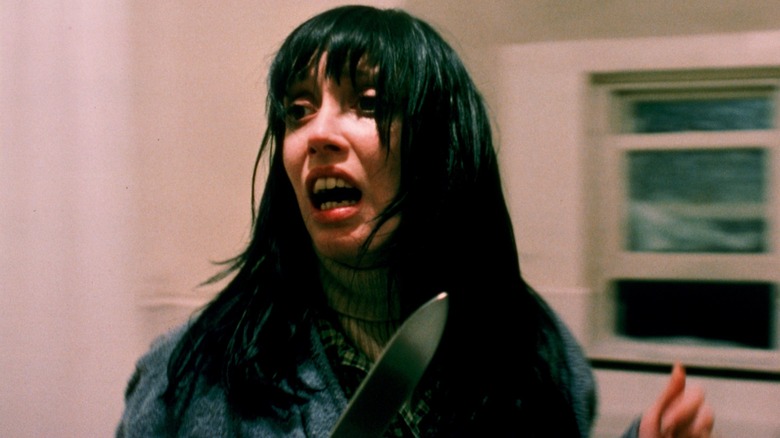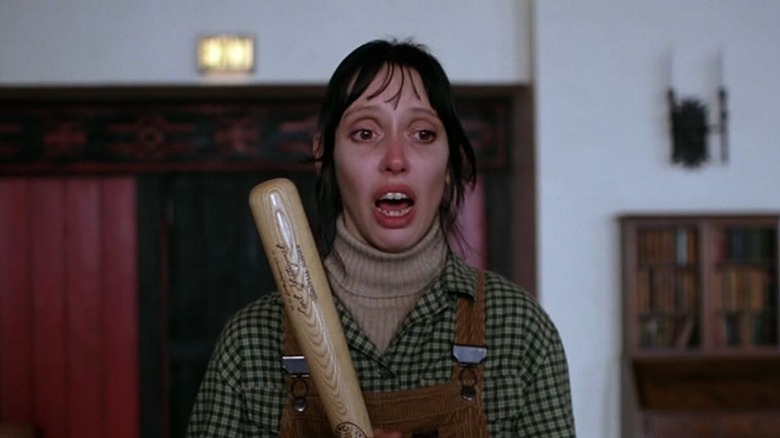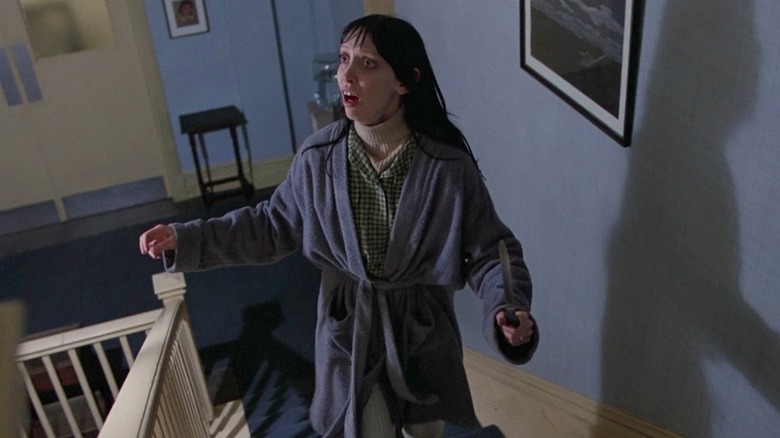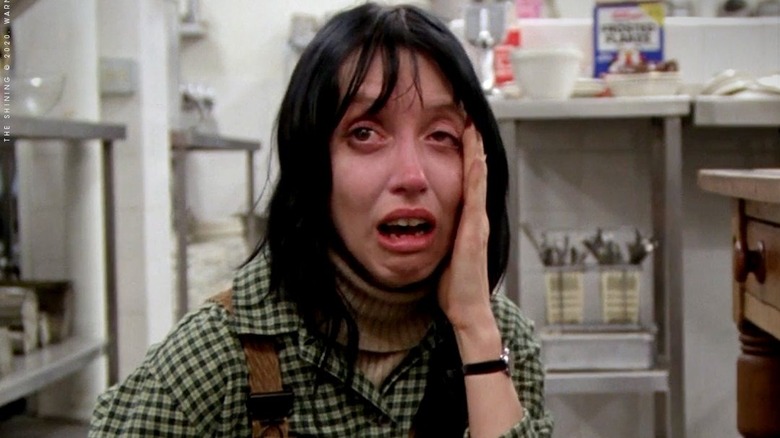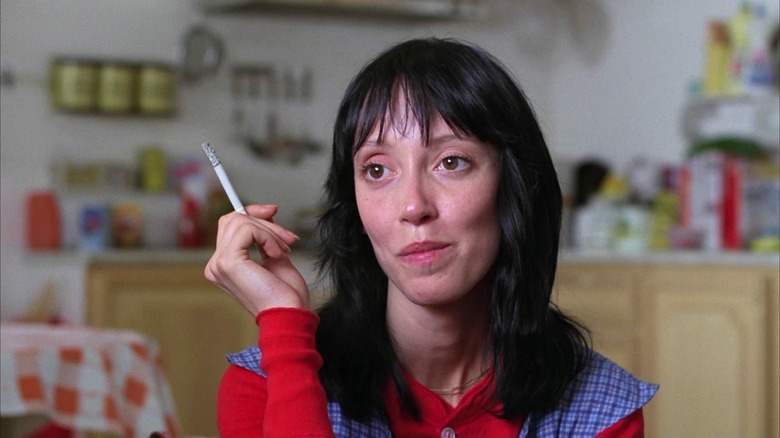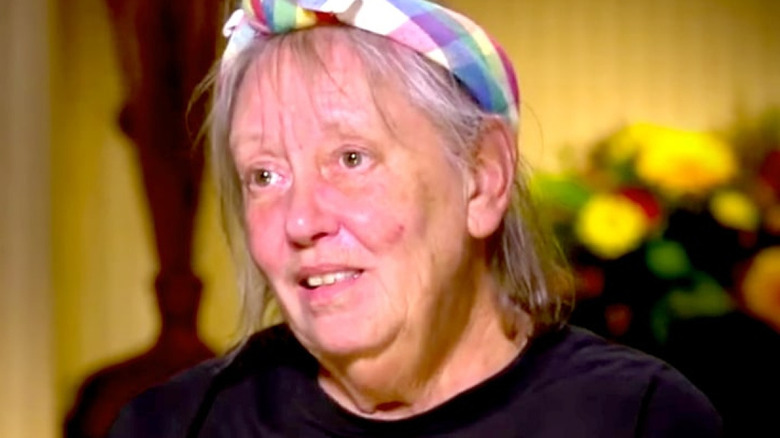How The Shining Changed Shelley Duvall Forever
In a now-infamous video shot by a 19-year-old Vivian Kubrick, her father Stanley calls action for Shelley Duvall before a scene in "The Shining." Perhaps it was because Kubrick was outside and Duvall was behind a large door to the set of The Overlook Hotel, or perhaps the sound of Kubrick calling for action was muffled by the snow machine blasting at the set, but Duvall misses her cue. Kubrick calls "cut," and then meets Duvall at the door not to figure out why the cue was missed, but instead to ream her out, telling her "you're wasting everyone's time." Following this clip, Vivian Kubrick's making-of documentary shows Duvall saying that she doesn't think her performance would have been as good if Kubrick hadn't gotten a rise out of her, but notes that Kubrick knowingly treated her this way in order to get the performance. She looks calm. She smiles.
She seems positive, but that was over 40 years ago. In the years since the release of "The Shining," much has been revealed about the horrendous working conditions for all of the cast and crew of the film, but none as extensive or as exhausting as Shelley Duvall. At the time, Duvall was a star on the rise, but Kubrick's treatment of her on set almost made her walk away from acting for good.
Kubrick Completely Mistreated Duvall on Set
The magnum opus of his cruelty toward Duvall came in the form of one of "The Shining's" most iconic scenes — the baseball bat confrontation on the stairs. Kubrick made Duvall and Nicholson shoot the scene in a record-setting 127 takes, something that horror fans love to spout off as a fun bit of trivia. The result of the constant takes were Duvall's hands were shredded raw from gripping the bat for such a prolonged period of time, her voice was hoarse from crying, her eyes became swollen, and she left the set completely dehydrated. The moments we see on screen of Duvall crying in pain, fear, and exhaustion were not acting, but an actor delivering lines while enduring a trauma response.
Kubrick's psychological brutalization of Duvall was so severe, her hair began falling out. "To wake up on a Monday morning, so early, and realize that you had to cry all day because it was scheduled — I would just start crying," Duvall said in an interview with The Hollywood Reporter. In the equally iconic "door scene," Jack Nicholson destroyed nearly 60 doors to get the shot to Kubrick's liking, filming this one moment over the course of three days. The scene was mostly improvised, and Kubrick reportedly kept information regarding Nicholson's choices to tear down the door with an axe from Duvall, meaning her reactions are authentic. This isn't acting, this is responding to trauma.
The Difference Between Acting and Reacting
There's a quote from actress Dee Wallace in an interview she did for "Eli Roth's History of Horror" where she recounts the exhaustion from shooting "Cujo." In it, she states, "What most people don't understand is that your body does not differentiate between a perceived threat and an actual threat. So I blew all my adrenals out because for eight weeks, literally, I was in fight or flight."
This helps explain what was going on with Duvall. No matter how much she tells herself "I'm acting" and no matter how much she knows the actions she's performing are scripted, the body is going to respond to the circumstances as if they're truly happening. Vivian Kubrick's documentary, "Stanley Kubrick: A Life in Pictures" doesn't shy away from her father's ridiculous methods, with co-star Jack Nicholson admitting that Kubrick acted like "a different director" when dealing with her.
Many of Duvall's lines were unexpectedly cut, she was frequently kept isolated, and she was forced to wait for extensive periods of time before performing her scenes to throw her off. Vivian's documentary even shows moments of Kubrick not acting alone, but instead requiring the rest of the crew to follow his lead. "Don't sympathize with Shelley," he says to the crew. He also made the decision to never compliment her work, and instead criticized every choice or impulse she had for the character. At one point, he encourages the rest of the crew to ignore her and tells them to disregard any needs she expresses. Kubrick is notorious for being a perfectionist, but at what cost?
'I Don't Know How I Did It'
Kubrick chose to shoot "The Shining" chronologically, which pushed the filming to a whopping 500 days. This means Duvall spent over a year of her life being tormented by a man in an untouchable position of power. Kubrick was already considered an auteur at this point in his career, with his unconventional (see: abusive) techniques hailed as genius rather than correctly identified as harmful. He was awarded and given the space to direct anything he wanted. Many have tried to defend Kubrick by referencing the clips from Vivian's documentary where Duvall speaks positively about the director's choice to treat her subhumanly, but never do they put it in context. If the daughter of the man with enough power to make or break the rest of Duvall's career puts a camera in her face and asks how she feels about his process ... what else do people expect her to say?
In The Hollywood Reporter interview, Duvall said, "I don't know how I did it. Jack [Nicholson] said that to me, too. He said, 'I don't know how you do it.'" Author Stephen King has not shied away from his hatred of Kubrick's film, and the treatment of Duvall as Wendy is part of it. "She's basically just there to scream and be stupid and that's not the woman that I wrote about."
She had an anxiety attack on set
At one point in Vivian Kubrick's documentary, Duvall is shown lying on the floor with assorted cushions around her. It was a clear attempt to highlight the grueling process of moviemaking, but in actuality, this was footage of the aftermath of an on-set panic attack. Duvall confirmed this in an interview with ComingSoon.net, where she said, "For the longest time I couldn't remember what exactly was happening at that moment, but I do recall I had a really bad anxiety attack on set, and I believe that was what is shown in the documentary." Duvall continues to explain that the shooting days were often 15-16 hours long, and breaks were hard to come by. "The shoot was very hard on me and I got to the point where I just couldn't take anymore, I needed a break, but taking a break costs money and people need the shot done, so I had a little breakdown," she said.
"[Kubrick] has a vision in his head of what he wants to see through his camera and if you don't quite understand where he is coming from he gets frustrated and angry," she said. "Communication and understanding plays a big part of film sets, I just wasn't getting it, I did in the end." It's hard to hear Duvall speak about the experience because despite describing what is clearly an unacceptable work environment and mistreatment, she's still optimistically trying to justify what happened to her. The reality is that no actor should be pushed to the point of having an anxiety attack on set, and if the circumstances become this extreme, protective measures need to be taken. Duvall deserved better.
We Need To Call It What It Is
Duvall appeared on the "Dr. Phil Show" in 2016, clearly in need of legitimate help and speaking incoherently. Dr. Phil treated it like sensationalist exploitation, but when he asked about "The Shining," her response was the most honest she'd been in years. "I guess this is what most people know me for, right? And look, I won't get into too much detail now, but that film was hell to be a part of," she said. She followed by saying:
"I mean, there was a great cast — Jack, Scatman [Crothers], Danny [Lloyd]. They were all wonderfully hilarious people, but then there was Stanley Kubrick, the director of this iconic masterpiece. All I'll really say for now is that if he hadn't directed the way he did, if he hadn't done everything with force and cruelty, then I guess it wouldn't have turned out to be as it was."
There's a tragic acceptance to Duvall's perspective, as if she has bought into the lie that she wouldn't have been as good in the role without having endured harm, or as if she has convinced herself that the torture she underwent was necessary for the film to be as beloved as it became. Duvall didn't have the opportunity to act, because she was too busy trying to maintain sanity while being psychologically exploited. That's not the sign of a bad actor, that's the sign of a bad director. To put a person in the position of feeling threatened and fearing for their life for 127 takes on a staircase is not legendary or the work of a perfectionist — it's abuse, and we need to start calling it what it is.
